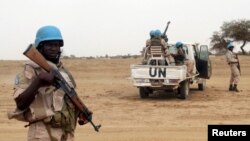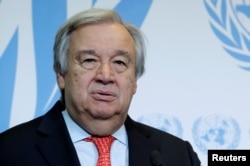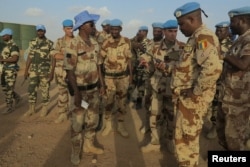United Nations Secretary-General Antonio Guterres marked the 70th birthday of the world body's peacekeeping operations this week by paying a visit to Mali. The West African nation hosts a U.N. mission known as MINUSMA. Guterres reinforced his commitment to the mission, which is the deadliest ongoing mission for U.N. peacekeeping forces, but also asked for more support to keep it strong.
The United Nations family in Mali came out in force this week to mark what it called Blue Helmet Day: a day to honor the service men and women who put themselves in harm's way, for peace.
Guterres was on hand to take part in the ceremonies. The U.N. mission in Mali has cost the lives of almost 100 military personnel and 172 people in all. It's the highest death toll of any ongoing U.N. peacekeeping mission in the world.
There are 13,500 peacekeepers in Mali and that’s not all. The French have their Operation Barkhane and the European Union trains Malian army personnel. And there’s another peace mission on the horizon: G5, a force with soldiers from Mali, Niger, Burkina Faso, Chad and Mauritania.
Guterres went to see the G5 headquarters in Central Mali, on Wednesday.
Speaking at the end of his visit, the U.N. Secretary-General asked for more and predictable international financial support for the G5. The G5, he told reporters, is tasked with fighting terrorist movements and organized crime in the Sahel region and help protect the civilian population. But its financial situation is insecure.
Mali’s own soldiers are taking part in the fight against regional instability but are in great need of better equipment and better pay. Until they receive those things, Mali will depend heavily on foreign forces to protect its borders and its people.
Guterres announced that those foreign forces, and especially the U.N.’s mission to Mali, are working on measures to increase their own protection.
The spectacular attack last April that severely damaged Timbuktu Airport, where MINUSMA has a base, was a stark reminder of how vulnerable these troops can be.
"The U.N. will install closed circuit surveillance systems at the main base in Bamako, advanced warning systems and radar at some camps in the North, it will use sniffer dogs to find explosives, do extensive situational awareness training and conduct more operations designed to secure terrain,' Guterres said.
Will this be enough? A lot depends on the amount of international support that will be available for Mali, MINUSMA and the regional G5 Sahel Force.
Currently, there are serious shortfalls and this poses future problems. As Guterres put it: a failed Mali is a danger not only for its neighbors, but for a region stretching from the Sahel, across the Mediterranean and deep into Europe.
He said that containing the terrorist problem is better than dealing with its effects.






